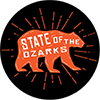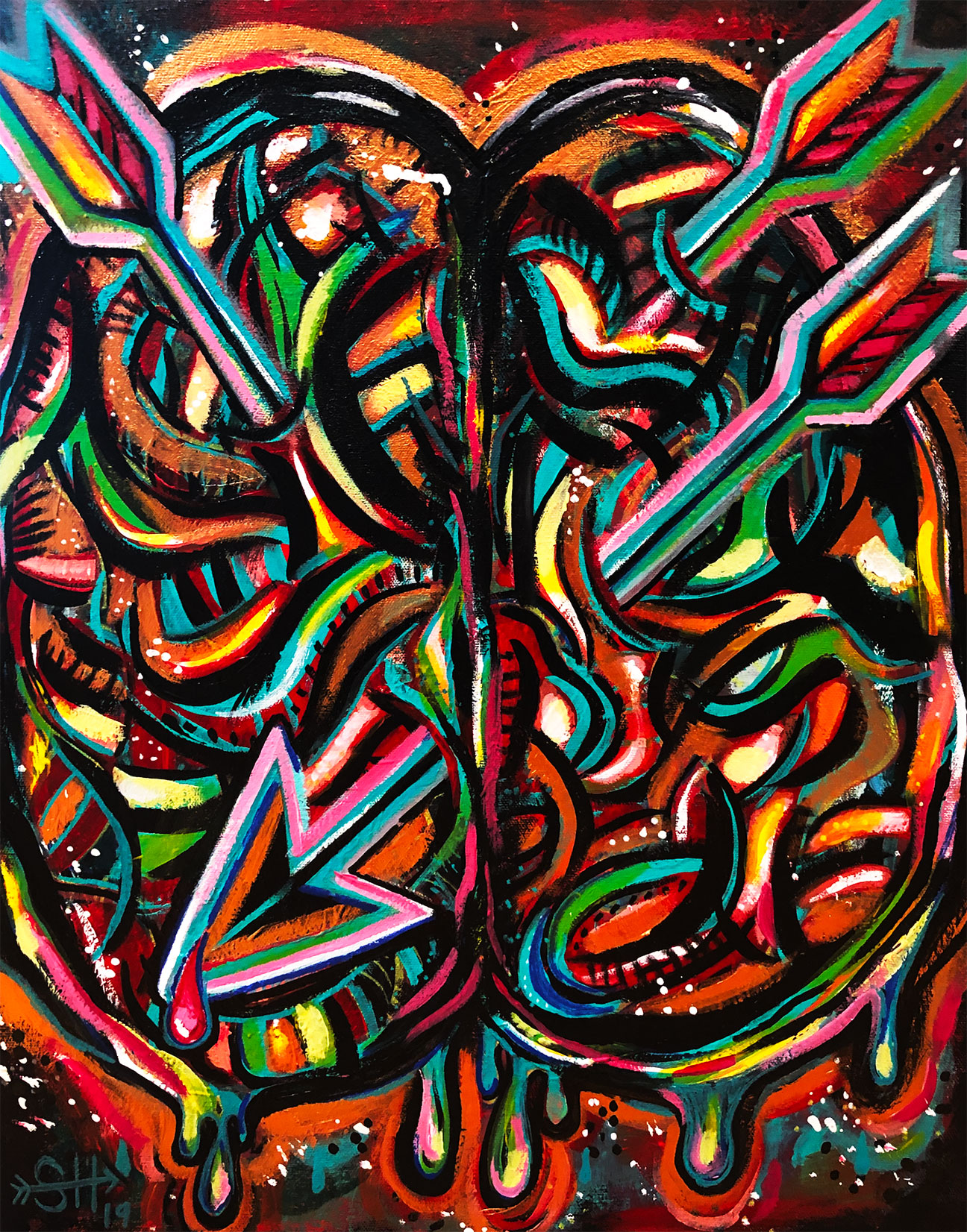PTSD: The Parent of Disease
by Jody Johnson Godfrey, FRS (art by Sarah Hebert)
For years, I wrote health columns for several publication conglomerates but, of late, I have come to realize that in writing about different diseases, I failed to go “backwards” enough in order to progress “forward.” However, in my defense, there is just now getting to be adequate and appropriate education/emphasis on PTSD. It is no longer labeled “Shell Shock” and assigned, exclusively, to soldiers.
I know President Trump has realized the seriousness of the Opioid Addiction and has allotted money to fight this monster, but my hopes and prayers are that he will become aware of the root cause of these addictions (all addictions, inclusive of hoarding and gluttony, etc.) and relate them back to the possibility of PTSD linkage and fund certificated education programs in each state for “First Aid for PTSD.”
PTSD: A Working Definition – various thoughts, feelings or physical responses which are ongoing/long-term and will not disappear; and that routinely cause either a negative logistical or mental outcome.
Perhaps, a more simplified definition could be that PTSD causes us to be perpetually, sad, mad, and/or scared and can keep us from using our talents and attaining greatness or success as well as propelling us into habitual chaos, crime…but most often…physical disease.
Manifestation of PTSD – diabolical disorder can show itself in so very many forms; the least of which may be stuttering, OCD, ADD/ADHD, and generally withdrawing from people and life. Often times, the sufferer (quite understandably) will seek to obtain disability so they are not forced into a daily social situation such as the workplace. More serious manifestations can be the majority of psychological conditions such as multiple personality disorders on up to the category of serial killers and mass murderers.
Causes of PTSD – This can be tricky and complicated, so I will just cover a portion of it due to the size constraints of this artic; let me talk about “the olden days” for just a moment. Between listening intently to my grandparents recitations of “what a regular day was” and watching my favorite TV programs (Walton’s and Little House, etc.), I have figured out that people, then, seemed much stronger and sturdier than most of us, nowadays. And no, they didn’t exist as long as we do presently, but they were used to trauma, chaos and disasters on a daily basis, pretty much. I have no doubt that if someone could board a time machine (if they existed) and go back to any period of the Agrarian Age…and if we popped out and said “Hey there, have a good day!”…we would be looked at as though we were nuts and I’m not referring to the way that person was dressed!! People rarely had what we would term as a “good day.” They did not expect to have “good days,” least not very many of them, for sure.
By “life experiences” comparison, we are like babies who are stunted and cannot grow; we are soft and spoiled and expect too much from life when we do not always adequately contribute to it. Physical exercise (labor) can often neutralize sadness and anger, etc. We were created to be physical beings, so even though the problems of life are different than those of our predecessors’, the need to work through or neutralize has not disappeared! Sitting in front of a computer (which most of us are forced to do, now) is not vaporizing our obstacles or, more importantly, isn’t the correct or healthy way we should respond to. So then the “end product” instead of “working the sadness or madness out” is “working those feelings into our bodily systems, organs and cells” which, thereby, leads to systemic inflammation, aka baseline of disease, in general; psychological and physical!
Also, before and different from the present, people in the Agrarian Society lived in close proximity to their families. With this, you have a built in support system. Additionally, class-wise, most everyone (except the General Store owner?) was in the same strata, financially. There was no talk of “winners/losers” or “overachievers and underachievers.” They all struggled to make ends meet which was just another layer of kinship or comradery. So the pressure of “making something of yourself” was pretty much non-existent. I guess, my point here is that with our world such as it is (and has been for a good while, now), there is no shortage of causes and reasons for people to feel inadequate, boxed in and “futile.” Thus, we have PTSD! And then, keep in mind, too, I’ve not even embarked upon the difference in the crime statistics between “then and now,” along with the trauma of war and natural disasters thrown into the mix!! In this article, I just am trying to convey the sheer enormity; the vast number of people who suffer from PTSD (along with the “why’s and how’s). And this is just simply from having to live life NOW as opposed to 40 or 50 years ago. And yes, I’m the first to admit we have many modern conveniences, but they only make PART of life easier.
Cure/Management of PTSD Since I do not believe in or condone taking prescription medications (until they can be created WITHOUT side effects), I will not address that “component” of treating PTSD, but rather the needed one-on-one counseling and group support models. These lend comradery and greatly counteract their suppositions that PTSD sufferers are “freaks;” the “warm fuzzies” go a long way to dispel these feelings about themselves which is the first step in the recovery process
There are solid educational therapies and strategies out there available that counteract PTSD symptoms very well. There may be some experimentation involved as all therapies may not work for everyone; it isn’t an exact science, but the main thing is to read, learn and keep on trying. Once you have found YOUR THERAPY NICHE, you have every reason to believe that your life can be much more than a negative outlook and perception, going forward.
I am a HUGE proponent of prevention (for all bad outcomes!) and truly recommend that schools start in very early with the kiddos letting them know all about PTSD and HOW letting it go untreated can lead to substance abuse. No doubt, many drug users get into the habit just out of sheer curiosity. They may feel fine or ok, but just want to see what it is like to “feel better.” However, I think the majority of the people who fall into this drug trap are simply hoping to mask their pain from PTSD. They feel so alone and have no one or no entity that can help them through this and educate them as to what is wrong
To learn more about this condition, put into your search engine “PTSD Management.” Perhaps someday we, as a whole, can be better educated and thus much more understanding of the manifestations of this disease and considerably more optimistic of its treatment outcome








